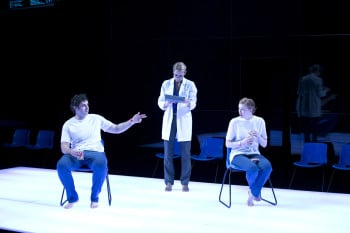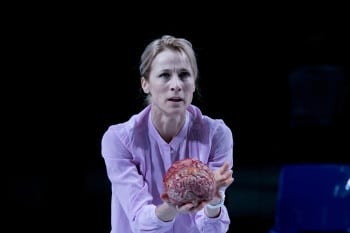Review: The Effect – Wharf 1 Theatre
The Effect is only Lucy Prebble’s third play (fourth, if you count a short, prize-winning play she wrote at university). Best known for the fast-paced study of scandal in ENRON, her latest is a look at love, or science, or both; mental health and attraction and brains and souls.
Prebble distils these concepts into her four characters: Toby (Eugene Gilfedder), the scientist who thinks that his new drug can simulate love, which is the same thing as love (parallel to feelings on anti-depressants); Dr. James (Angie Milliken), carrying out the drug trial, who has a history with Toby. And then there’s Connie (Anna McGahan) and Tristan (Mark Leonard Winter), participants in the trial – Tristan laid-back, unstructured, unbothered, and Connie contained, a planner, an achiever.

As the drug trial progresses, Tristan and Connie take an interest in each other, the kind of interest that leads to an inevitable emotional/physical explosion. It violates the rules of the drug trial, but it makes Toby excited. Has he created love in these two people? Is this the evolution of anti-depressants?
It’s not quite as exciting for the clinical Dr. James, though; she struggles to separate their feelings from the drug’s effects, questions the ethics of simulating something so intense.
And we’re off, and on it goes, into love and depression and the personal, private hell of ourselves, and of others.
There’s a witty-cool conversational tone to much of the play’s first act, with Prebble really sinking her teeth into the meet-cute between Tristan and Connie, but the play is too long and starts to sputter out somewhere in the second, where its tone shifts dramatically.
Its reach is impressively broad, bringing debate about mental health treatment and the nature of dealing with depression to the forefront, particularly the handling, treatment and perception of depression in an age where it’s more well-known and discussed than before. This is fine, good, a nice change from plays that never say anything, but it tends to feel like the play exists purely as mouthpiece; that the drama is there for the debate, rather than the other way around.

Still, there are worse things to give a mouthpiece on stage than mental illness, its stigmas, and treatment, and it should be credited for that, even though the play seems to veer off course in the second act with a major tonal change.
The set (Renee Mulder) is clean and stark, a raised platform, white with blue chairs and a couple of screens letting us know which dosage we’re up to, letting us see MRI results, and falling dark for the second act (possibly forgotten?) A blank slate, essentially, bringing our focus in sharply to the actors. Winter and McGahan shine brightly as the would-be lovers; Winter brings an easy charm and accessible heart to his character, which means we buy it when he’s not laughing all the time, and McGahan is guarded but never cold, a study in unfurling, however reluctantly, for love.
Goodes directs with a steady, occasionally sharp hand, but she allows the play to linger in its lighter, brighter moments. In Tristan’s dance (movement by Bill Simpson), or in the rush of sexting, poses shifting in nervous excitement. In a way, the naturalist approach to human relationships and dialogue that understands how you speak forms relationships, is such a good fit for Goodes; her direction here feels like an evolution of her work on Vere, which she helmed for STC last year. There’s an empathy to her take on plays that manages to find the balance between light and dark – the kind of balance that reminds us we are never so fully in one that we are without the other.
The Effect asks: what would you do to trade the dark for light? And then it asks, why would you even begin to ask that question? But it captures the promise of love, the fragility of our brains, and doesn’t let you turn your brain off, which is worthwhile.

